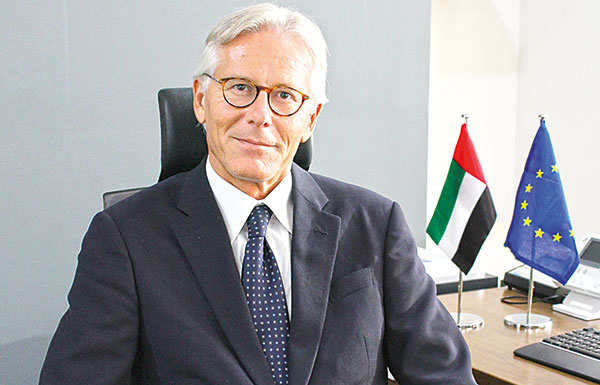UAE must do more on Transparency to Get off tax Blacklist: EU Envoy

2017-12-08 - 7:04 p
Bahrain Mirror- reuters: The United Arab Emirates will have to do more to address the European Union's concerns about tax transparency if it is to be removed from a tax-haven blacklist, the EU's ambassador to the UAE said on Wednesday.
He was speaking a day after EU finance ministers adopted a blacklist of 17 jurisdictions deemed to be tax havens, including UAE and Bahrain, in an unprecedented step to counter worldwide tax avoidance.
"The EU has been in touch over the last months with the UAE authorities and the UAE made a certain number of commitments," EU ambassador Patrizio Fondi said in an email to Reuters.
But he added that the UAE "does not apply the BEPS (base erosion and profit sharing) minimum standards and did not commit to addressing these issues by Dec. 31, 2018."
BEPS refers to an agreement signed by some OECD member countries to tackle tax avoidance strategies that allow multinational companies to shift profits artificially to low or no-tax locations.
Countries on the blacklist may no longer be used by EU institutions for international financial operations, and transactions involving them could be subject to closer scrutiny. Fondi said officials in Brussels were still discussing what the full consequences for the UAE of being listed would be.
The UAE, particularly Dubai, is the main international financial center for the Middle East, so if companies and individuals become more cautious about moving their money through the UAE because of the blacklist, billions of dollars of capital flows could potentially be affected.
The governments of the UAE and Bahrain did not respond to Reuters requests for comment on Wednesday.
A banking industry consultant, who declined to be named, said the EU was concerned about some of the UAE's many free trade zones, which attract foreign investment by offering special tax and customs regimes and have their own regulatory frameworks.
While there are a lot of foreign companies doing business legitimately in these zones, some may be evading tax, the consultant said.
Fondi said UAE authorities would receive a letter from the EU in coming days detailing what they could do to be removed from the blacklist.
"The placement in the list must not be seen as the end game: on the contrary, the exercise is ongoing and remains a matter of cooperation between partners," he said.
Gary Dugan, former chief investment officer of National Bank of Abu Dhabi, said the timing of the UAE being placed on the blacklist was surprising, as most banks in the Dubai International Financial Centre and in the onshore market had already cleaned up their books in the last few years.
"This will make some of the European private banks nervous, and might tighten their compliance even more to make sure they don't get on the wrong side of a fine," he said.
- 2022-07-07Israel Reaches Record Trade Increase With Arab States Under Abraham Accords
- 2022-06-10Israeli PM Bennett Visits Abu Dhabi, Meets with UAE President
- 2022-06-10Israelis to be Allowed into Qatar for World Cup, Officials Say
- 2022-06-06Biden should not Visit Saudi, Meet Crown Prince: US Lawmaker Adam Schiff
- 2022-06-01Israel Signs UAE Free Trade Deal, Its First in Arab World